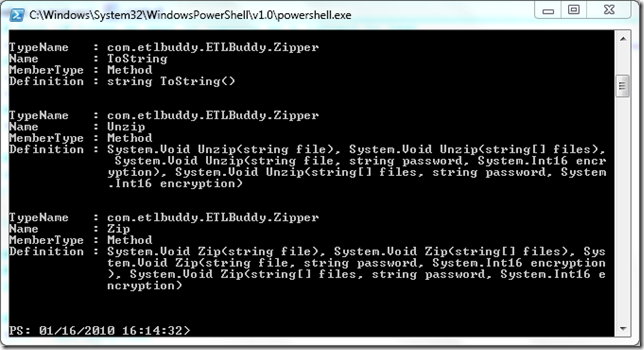Using .Net libraries in Powershell
One of the great things about Powershell is its ability to take advantage of the .Net platform. If Powershell can’t do it you bet there’s a .Net library that can. Not only is this great for extending your scripts but I also like to use Powershell to test some of my classes. Rather than fire up RAM hungry Visual Studio I can just script out a few tests in Powershell.
Here’s quick script you can modify to compile a .cs file to produce a library for Powershell to load. This gives me the flexibility to quickly test individual classes from a project. The class I was testing here is just a wrapper around the functions of DotNetZip. A reference is included, just remove this if your class doesn’t need it. At the end of the script the .dll file will be loaded and its methods will be listed by a call to Get-Member.
# Your c# class we want to compile as a library to test
$csharp_file = "`"C:\Users\Rhys\Documents\Visual Studio 2008\Projects\ETLBuddy\ETLBuddy\Zipper.cs`"";
# Path to csc compiler
$compiler = "$env:windir\Microsoft.NET\Framework\v3.5\csc.exe";
$cmd = "$compiler /target:library $csharp_file "
# Add any external library you're referencing, empty string if none
$reference="C:\Users\Rhys\Desktop\Ionic.Zip.dll";
# Add reference if needed
if($reference -ne "")
{
$cmd += " /r:`"$reference`"";
}
# Invoke-Expression tells ps to evaluate the string as a command
# otherwise it would just print it out
Invoke-Expression $cmd;
# Now load the dll
$dll = Get-Location;
$dll = $dll.ToString();
$dll = $dll + "\" + $csharp_file.Substring($csharp_file.LastIndexOf("\") + 1) -replace(".cs", ".dll") -replace("`"", "");
[Reflection.Assembly]::LoadFile($dll -replace(".cs", ".dll"));
# Create a new object from the loaded dll
$obj = New-Object "com.etlbuddy.ETLBuddy.Zipper";
$obj | Get-Member;
From the output here you can see there are two methods called Zip and Unzip.
Now I have a dll I can put to work in my Powershell Scripts! Once this is done it’s really quite simple to get started.
# Load the Zipper dll
# Needed to run gacutil /i "C:\Users\Rhys\Desktop\Ionic.Zip.dll" so this would work
[Reflection.Assembly]::LoadFile("C:\Users\Rhys\Documents\powershell\Zipper.dll") | Out-Null;
# Create a new zip object
$obj = New-Object "com.etlbuddy.ETLBuddy.Zipper";
# Zip a copy of a library
$obj.Zip("C:\Users\Rhys\Documents\powershell\Zipper.dll");
After execution I have a new zip file in my Powershell working directory.
That’s really all there is to begin using an external library in your Powershell scripts. For further info checkout How to create an object in Powershell.

